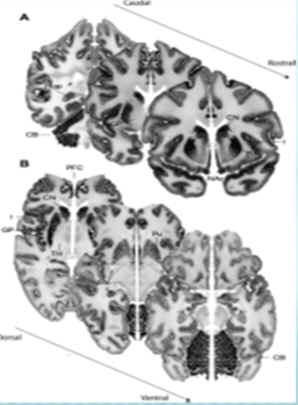|
Researcher
Neuronal
Substrates for Developmental Toxicity
Our lab has studied the effects of addictive drugs on the functional ontogeny of the CNS, during both prenatal and adolescent development, with a special emphasis on male-female differences. These highly translational studies have contributed greatly to understanding brain-behavior interactions and how drug exposure during development alters the neural underpinnings of behavior. Recently, our focus has been on marijuana and the effects of use on brain and behavior development.
Dr. Dow-Edwards has worked with outstanding researchers for many years studying the effects of marijuana on human and animal brain development. This image of the CB1 receptor in human brain shows that cannabis affects virtually every system in the brain. Cannabis exposure during fetal development and during adolescence alters the trajectory of behavioral development including cognitive development, mental health and addiction.
 |
|
Dr. Dow-Edwards has been funded by the NIH for over 25 years to study the effects of a range of substances on brain function. She trained at the National Institute of Mental Health and the National Institute on Aging, both Institutes within the
NIH. She has also published extensively on the effects of abuse substances on brain functional development.
|
|
Distribution of the CB1 receptor in human brain. Each dot represents a receptor and illustrates the widespread areas that are affected by smoking marijuana on the brain
– Courtesy of Dr. Yasmin Hurd
|
|
|
|
Bibliography |
|